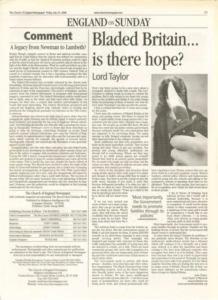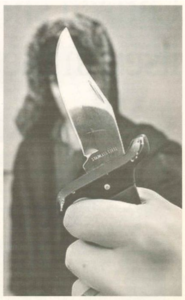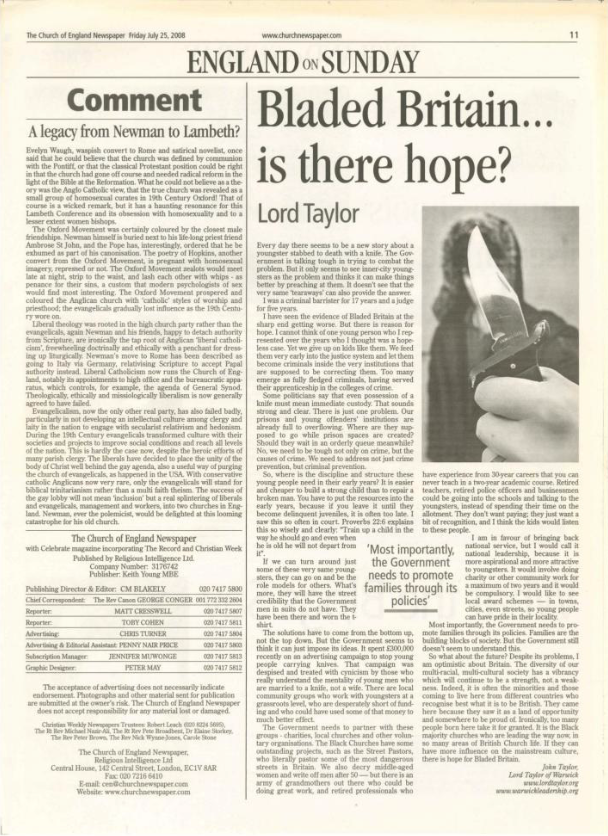Church of England Article By Lord Taylor of Warwick
 Every day there seems to be a new story about a youngster stabbed to death with a knife. The Government is talking tough in trying to combat the problem. But it only seems to see inner-city youngsters as the problem and thinks it can make things better by preaching at them. It doesn’t see that the very same ‘tearaways’ can also provide the answer.
Every day there seems to be a new story about a youngster stabbed to death with a knife. The Government is talking tough in trying to combat the problem. But it only seems to see inner-city youngsters as the problem and thinks it can make things better by preaching at them. It doesn’t see that the very same ‘tearaways’ can also provide the answer.
I was a criminal barrister for 17 years and a judge for five years.
I have seen the evidence of Bladed Britain at the sharp end getting worse. But there is reason for hope. I cannot think of one young person who I represented over the years who I thought was a hopeless case. Yet we give up on kids like them. We feed them very early into the justice system and let them become criminals inside the very institutions that are supposed to be correcting them. Too many emerge as fully-fledged criminals, having served their apprenticeship in the colleges of crime.
Some politicians say that even possession of a knife must mean immediate custody. That sounds strong and clear. There is just one problem. Our prisons and young offenders’ institutions are already full to overflowing. Where are they supposed to go while prison spaces are created? Should they wait in an orderly queue meanwhile? No, we need to be tough not only on crime, but the causes of crime. We need to address not just crime prevention, but criminal prevention.
So, where is the discipline and structure these young people need in their early years? It is easier and cheaper to build a strong child than to repair a broken man. You have to put the resources into the early years, because if you leave it until they become delinquent juveniles, it is often too late. I saw this so often in court. Proverbs 22:6 explains this so wisely arid clearly: “Train up a child in the way he should go and even when he is old he will not depart from it”.
If we can turn around just some of these very same youngsters, they can go on and be the role models for others. What’s more, they will have the street credibility that the Government men in suits do not have. They have been there and worn the t-shirt.
The solutions have to come from the bottom up, not the top down. But the Government seems to think it can just impose its ideas. It spent £300,000 recently on an advertising campaign to stop young people carrying knives. That campaign was despised and treated with cynicism by those who really understand the mentality of young men who are married to a knife, not a wife. There are local community groups who work with youngsters at a grassroots level, who are desperately short of funding and who could have used some of that money to much better effect.
The Government needs to partner with these groups – charities, local churches and other voluntary organisations. The Black Churches have some outstanding projects, such as the Street Pastors, who literally pastor some of the most dangerous streets in Britain. We also decry middle-aged women and write off men after 50 – but there is an army of grandmothers out there who could be doing great work, and retired professionals who have experience from 30-year careers that you can never teach in a two-year academic course. Retired teachers, retired police officers and businessmen could be going into the schools and talking to the youngsters, instead of spending their time on the allotment. They don’t want paying; they just want a bit of recognition, and I think the kids would listen to these people.
I am in favour of bringing back national service, but I would call it national leadership, because it is more aspirational and more attractive to youngsters. It would involve doing charity or other community work for a maximum of two years and it would be compulsory. I would like to see local award schemes – in towns, cities, even streets, so young people can have pride in their locality.
Most importantly, the Government needs to promote families through its policies. Families are the building blocks of society. But the Government still doesn’t seem to understand this.
 So what about the future? Despite its problems, I am optimistic about Britain. The diversity of our multi-racial, multi-cultural society has a vibrancy which will continue to be a strength, not a weakness. Indeed, it is often the minorities and those coming to live here from different countries who recognise best what it is to be British. They came here because they saw it as a land of opportunity and somewhere to be proud of. Ironically, too many people born here take it for granted. It is the Black majority churches who are leading the way now, in so many areas of British Church life. If they can have more influence on the mainstream culture, there is hope for Bladed Britain.
So what about the future? Despite its problems, I am optimistic about Britain. The diversity of our multi-racial, multi-cultural society has a vibrancy which will continue to be a strength, not a weakness. Indeed, it is often the minorities and those coming to live here from different countries who recognise best what it is to be British. They came here because they saw it as a land of opportunity and somewhere to be proud of. Ironically, too many people born here take it for granted. It is the Black majority churches who are leading the way now, in so many areas of British Church life. If they can have more influence on the mainstream culture, there is hope for Bladed Britain.
